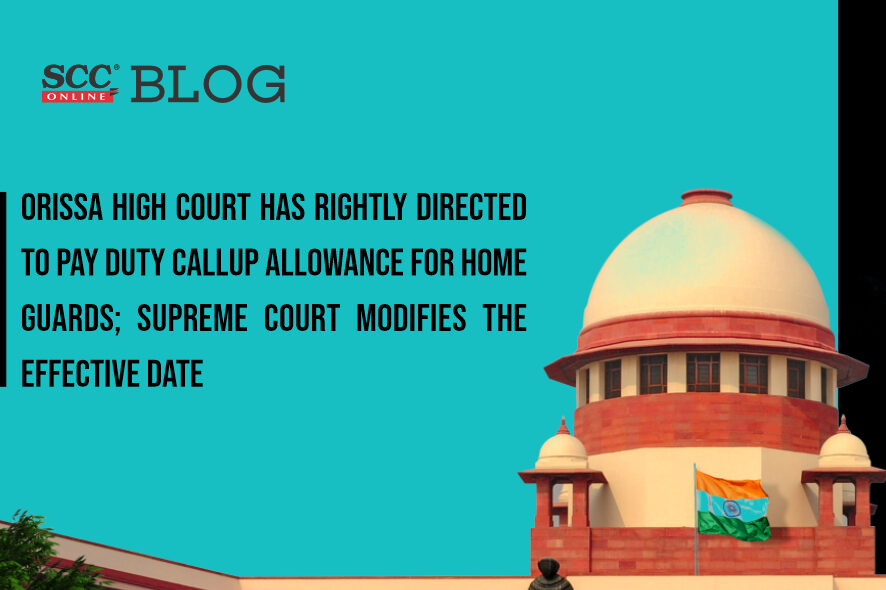Supreme Court: In appeals filed by the Home Guards and the State against the impugned judgment and order passed by the Orissa High Court, the division bench of MR Shah* and MM Sundresh, JJ. held that the High Court has rightly directed to pay the Duty Call-up Allowance (‘DCA’) at Rs. 533 per day, but it was not justified from restricting the benefit from January 2020 instead of 10-11-2016, further it dismissed the appeal preferred by the State. However, taking into consideration such a huge financial burden, the Court restricted the benefit of DCA at Rs. 533/- per day from the date of filing of the writ petition before the Single Judge which would be from 01-06-2018.
Background:
In the case at hand, the petitioners were working as Home Guards for more than 10 to 15 years under the Home Department of the State of Orissa. After 10 to 15 years of service, they filed a writ petition before the Single Judge for a direction to the State to disburse their salary as per the direction in Home Guards Welfare Assn. v. State of H.P., (2015) 6 SCC 247 (‘Grah Rakshak case’) and clarificatory order dated 04-05-2016 passed in Contempt Petition (C) Nos. 699-700 of 2015, A relief was also sought to give them the benefit of the 7th Pay Commission from the date the same had been given to their counterparts in the other States.
Earlier the Director General of Orissa Police recommended payment at the minimum sum of Rs. 533 per day taking into consideration the remuneration available to the Constables in the State in the lowest rank in the Police personnel. The Single Judge directed the State Government that the Home Guards in Orissa, pending decision, be paid provisionally at the minimum Rs. 500/- from January 2020, subject to the final decision of the Government of Orissa on implementation of the recommendation of the Director General. Aggrieved by the said order, the State preferred an appeal to the division bench, which upheld the Single Judge’s decision. However, restricted the payment at the rate of Rs. 533 per day to the Home Guards from January, 2020, instead of 10-11-2016, as directed by the Single Judge. Thus, the Home guards and State filed the present appeals.
The Court said that the issue that whether the Home Guards working in the State are entitled to DCA /Duty Allowance as per minimum of the pay to which the Police personnel of the State are entitled is not res integra in view of the decision of this Court in the case of Grah Rakshak (supra). Further, it noted that the Court declined to grant the relief either for regularisation of service or for grant of regular appointments.
The Court also noted that the State Government did not pay the DCA as per the judgment of this Court in the case of Grah Rakshak (supra). Further, under Rule 2013, the Constables in the State initially are appointed on a contractual basis and thereafter, after few years of service, they are made permanent. However, after they are made permanent, they are being put to the minimum of the pay scale.
Therefore, the Court said that the Home Guards shall be entitled to the DCA taking into consideration the minimum of the pay to which the Police personnel of the State are entitled at the time of their initial appointment on regular basis/permanent basis, after rendering their contractual services under Odisha Group-C & Group-D (Contractual Appointment) Rules, 2013 (‘Rule 2013’)
The Bench noted that the decision of this Court in the case of Grah Rakshak (supra) and further clarificatory order has also been complied with by several States. Therefore, the Court said that the State of Orissa cannot be permitted to now submit that as contractual Constables appointed under Rule 2013 are being paid a fixed lump sum amount at the entry level, the Home Guards after rendering 10 to 15 years of service also shall be entitled to the same fixed salary. The aforesaid stand would be just contrary to the directions issued by this Court in the case of Grah Rakshak (supra) and the subsequent further clarificatory order.
Thus, the Court held that the High Court has rightly directed to pay the DCA at Rs. 533/- per day, and dismissed the appeal preferred by the State.
Moreover, the Court said that no cogent reasons have been assigned by the Division Bench of the High Court to restrict the benefit of Rs. 533/- per day from January, 2020 instead of 10-11-2016. Further, the Director General recommended on 10.11.2016 to pay DCA at Rs. 533/- per day which was in consonance with the decision of this Court in the case of Grah Rakshak (supra) and the subsequent clarificatory order. Therefore, it was held that the Division Bench of the High Court is not justified in restricting the benefit of the DCA at Rs. 533/- per day from January, 2020.
However, the Court said that , as there were 17765 Home Guards working and there will be a financial implication of Rs. 51,78,775/- on the Government per day towards payment of DCA at Rs. 293/- per day (Rs. 533 – Rs. 240) and the annual financial implication would come to Rs. 189 Crores if they are engaged 365 days a year. Thus, taking into consideration such a huge financial burden, the Court restricted the benefit of DCA at Rs. 533/- per day from the date of filing of the writ petition before the Single Judge which would be from 01-06-2018.
[Prakash Kumar Jena v. State of Odisha, 2023 SCC OnLine SC 293, decided on 17-03-2023]
*Judgment by: Justice MR Shah







